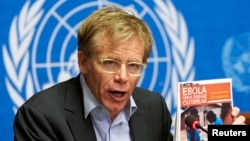The numbers of Ebola cases in Sierra Leone and Guinea have been rising and falling since Liberia was declared Ebola-free on May 9. The World Health Organization says that the road to zero will be bumpy, but that for the most part, progress in stopping transmission of the virus has been good.
The latest WHO figures put the number of cases in the three West African countries at 27,001, with 11,132 deaths. Over the past week, WHO reported 12 new cases of the disease — nine in Guinea and three in Sierra Leone, from a total of five districts or prefectures.
Bruce Aylward, WHO assistant director-general for emergencies, said this was a good sign.
“That is another bit of a landmark and important to recognize," he said. "Over the past month, we have been dealing with six or fewer districts and prefectures with active transmission. That is the lowest number of infected areas that we have been dealing with for a full year. So there is real progress in terms of the numbers, in terms of the geography.”
While the trends are positive, Aylward said it would take time to get the job done. He noted that Liberia took four months from the time it hit a similar caseload to get to zero cases. Aylward said that in the best-case scenario, Sierra Leone and Guinea could be Ebola-free by September, but that a likelier scenario would be for them to reach that goal by the end of the year.
Aylward said many challenges lie ahead, including the rainy season, during which it will be extremely difficult to move people and supplies around, fly helicopters to remote areas and ensure water is not leaking into treatment centers.
Moreover, he said, during the rainy season there is an surge in diseases such as malaria and diarrhea, which present symptoms that often are mistaken for Ebola.
Another, perhaps bigger challenge, Aylward said, is lack of money.
“Money is falling faster than cases. ... The situation with respect to the logistics of the rainy season and the operations — that is getting sorted out. The financing of it is not, and that is the challenge," he said. "There is no reason that Ebola cannot be beaten, but financing is increasingly becoming the most glaring potential reason for failure.”
The rains already have begun in West Africa, and they will become extremely heavy and unmanageable in June and July. Aylward said the World Food Program would need $50 million to fly people and supplies to remote Ebola-stricken areas over the next six months.
He said the WHO had been told to tighten its belt, but even after doing that, he added, the agency still is $100 million short of what it needs to run its many lifesaving operations. Aylward said the United Nations was developing a revised budget to include all U.N. agencies working on Ebola relief in West Africa.




